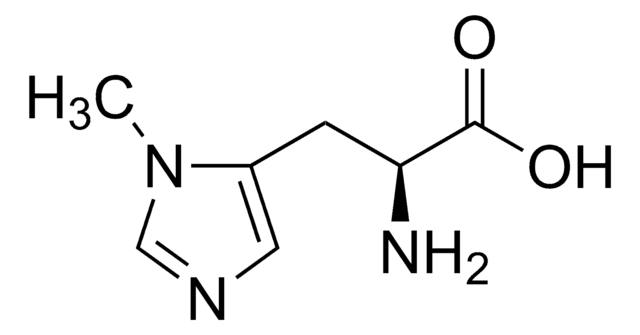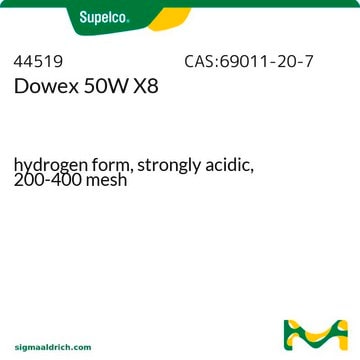SML0329
Carcinine dihydrochloride
≥98% (HPLC)
Synonym(s):
β-Alanylhistamine dihydrochloride, 3-Amino-N-[2-(1H-imidazol-4-yl)ethyl]propanamide dihydrochloride, Alistin, Beta-Alanylhistamine dihydrochloride
About This Item
Recommended Products
Assay
≥98% (HPLC)
form
powder
storage condition
desiccated
color
white to beige
solubility
H2O: >15 mg/mL
storage temp.
−20°C
SMILES string
Cl.Cl.NCCC(=O)NCCc1cnc[nH]1
InChI
1S/C8H14N4O.2ClH/c9-3-1-8(13)11-4-2-7-5-10-6-12-7;;/h5-6H,1-4,9H2,(H,10,12)(H,11,13);2*1H
InChI key
ZQTUNIWBUQUKAM-UHFFFAOYSA-N
Looking for similar products? Visit Product Comparison Guide
General description
Application
Biochem/physiol Actions
Features and Benefits
Signal Word
Danger
Hazard Statements
Precautionary Statements
Hazard Classifications
Eye Dam. 1 - Skin Irrit. 2 - STOT SE 3
Target Organs
Respiratory system
Storage Class Code
11 - Combustible Solids
WGK
WGK 3
Flash Point(F)
Not applicable
Flash Point(C)
Not applicable
Certificates of Analysis (COA)
Search for Certificates of Analysis (COA) by entering the products Lot/Batch Number. Lot and Batch Numbers can be found on a product’s label following the words ‘Lot’ or ‘Batch’.
Already Own This Product?
Find documentation for the products that you have recently purchased in the Document Library.
Articles
We offers many products related to histamine receptors for your research needs.
We offers many products related to histamine receptors for your research needs.
We offers many products related to histamine receptors for your research needs.
We offers many products related to histamine receptors for your research needs.
Our team of scientists has experience in all areas of research including Life Science, Material Science, Chemical Synthesis, Chromatography, Analytical and many others.
Contact Technical Service










